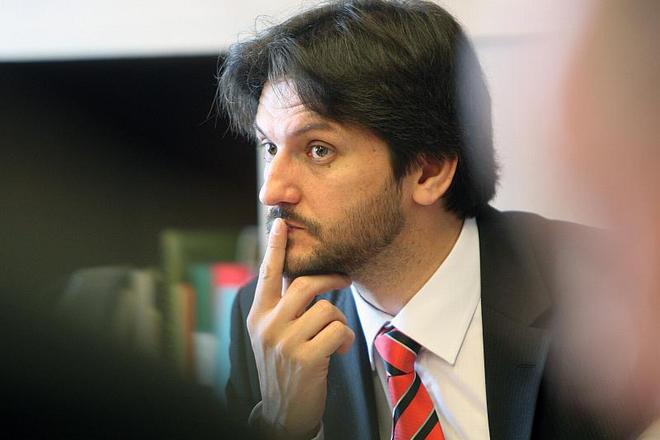SLOVAK public officials were not anxious to comment on scandalous videos of policemen abusing Roma boys at a police station in Košice last month. Following a ceremony to decorate valorous firemen at the Office of Government, Prime Minister Robert Fico strode from the room ignoring a request by The Slovak Spectator for comment.
Interior Minister Róbert Kaliňák was slightly more forthcoming on April 8, and after a regular meeting of cabinet condemned the behaviour of the Košice policemen.
At the same time, he rejected suggestions that the scandal indicated a deeper, systemic problem with racism in the Slovak police corps – during the following 10-minute interview, he repeated the phrase “failures by individual policemen” seven times.
And while he acknowledged that police must not be allowed to arbitrarily punish people they regard as criminals, on five occasions he referred to “street thieves and criminals” or “perpetrators” in reference to the Roma boys mistreated at the police station.
He did not explain what proof of their guilt he had in his possession. Only three of the boys have been charged, and none have been found guilty.
Do you have any reaction to the videos published yesterday?
Róbert Kaliňák (RK): The train of events started with the robbery of an elderly woman by six youths, following which the police responded. At the police station this turned into a situation that we fundamentally cannot agree with. It is really impermissible for police to punish street criminals and thieves by themselves – that’s what we have courts for.
For that reason, I immediately ordered the police inspectorate to launch a criminal investigation into abuse of power and extortion. The police president [Ján Packa] took quick and decisive steps, and travelled to Košice last night. As it stands at the moment, nine policemen have been suspended, seven of whom will be dismissed. Four of their superiors will lose their posts – the director and deputy director of the emergency response division, the local police chief, and the director of the police canine division, because it was their men who took part in the arrests and then were present at the police station.
Following the arrival of the new police leadership (following 2006 parliamentary elections), we started responding very decisively to situations in which individual policemen stepped over the line. It is very sad that several individuals have hurt the good work of thousands of police officers.
In many western countries after such an event it is normal for the head of the police or the interior minister to resign. Will that happen in Slovakia?
RK: If we look back at past cases, such as Karol Sendrei [a Roma man who was tortured to death in police custody in 2001], or the policeman who shot his entire family, no steps were taken against the superiors of the policemen involved. We introduced a new culture of punishing individual failures very harshly, including against police superiors. This was not a case of a systemic failure within the police, but of an individual failure by certain people.
On July 1, Slovakia will take over the leadership of the Decade of Roma Inclusion, a regional initiative of 12 countries to bring the Roma back into mainstream society. Do Slovakia’s police need a bit more training on minority relations before Slovakia takes on such a responsibility?
RK: I really think we’ve done enough in this regard, and all of it while working with Roma specialists, so I can definitely answer this question by saying it was an individual failure with which I fundamentally disagree, and again I should mention that even in the case of street thieves or criminals, the police cannot take punishment into their own hands, that’s what we have courts for. Even though those six boys committed a serious crime in attacking and wounding an old lady, we simply cannot allow ourselves to behave in that way towards those who perpetrate crimes. It’s unacceptable.
Do you think there needs to be better police screening at the point at which they enter the force to identify people prone to such individual failings?
RK: We have a standard approach that includes psychological testing. Regarding the policemen involved in this case, five of them joined the force under the previous Interior Minister Vladimír Palko, and the rest of them before that. I don’t think the measure exists that can prevent individual failures. It’s nothing exceptional in this country or in any other.
What was your first reaction when you saw the video?
RK: Anyone who watches it has to be left in stunned silence.
Do you see any parallels with the mistreatment of prisoners at the Abu Ghraib prison in Iraq?
RK: Parallels can be found in every form of behaviour that violates human dignity. But here it was a case of a sudden response by policemen who seem to have believed they could punish street criminals by themselves.
Because in Iraq there was a problem with systemic disrespect for Iraqi prisoners...
RK: In this case it was above all a matter of the unacceptable expression of a certain feeling between the perpetrators of a crime and policemen.



 Interior Minister Róbert Kaliňák (source: Sme - Pavol Funtál)
Interior Minister Róbert Kaliňák (source: Sme - Pavol Funtál)